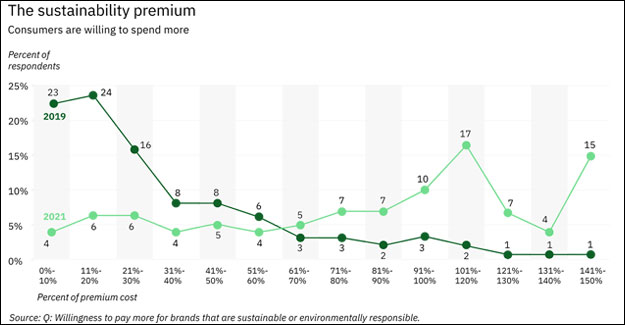
Sustainability Becomes More Important For Consumers And Brands: IBV
Future growth depends on consumer products and retail companies taking clear action on their sustainability goals today. The pandemic has intensified consumer demands for environmental sustainability and their resolve to back up those demands with their wallets. As extreme environmental events become common, people and enterprises are carefully weighing short-term expectations, such as convenience and cost-efficiency, against the existential need to preserve the planet. To better understand consumer opinions and perspectives on sustainability and how well-aligned consumer companies are with them, the IBM Institute for Business Value (IBV) surveyed more than 14,000 adults around the world. To examine developments in the sustainability agenda of the enterprise, IBV surveyed 1,900 executives globally about what they had planned for the next 12 months. The study aimed to understand if the enterprise view of sustainability is still focused on compliance and reputation, or are companies seeing sustainability as a viable path to operational improvement and business growth. Key findings When compared to two years ago, 22% more consumers say environmental responsibility is very or extremely important when deciding on a brand. And there are signs that we can expect this commitment to grow — 84% of consumers now indicate environmental sustainability is at least moderately important. The sustainability premium: Consumers are willing to spend more for brands that are environmentally responsible. Consumers are factoring in sustainability to their financial decisions. Half believe the climate change exposure of a company affects its financial risk —92% of this group expect to invest, divest, or lobby fund managers to change investment mixes based on environmental factors and/or social responsibility in the next 12 months. This group is nearly 1.5 times larger than that of personal investors who do not see climate change risk as a financial risk. In addition, sustainability is a major concern when it comes to personal mobility. Today, roughly 40% of consumers say environmental impact factors are more important than cost, comfort, and convenience — three criteria that used to define travel preferences. The sustainability metrics challenge Without crisply defined metrics, it’s almost impossible for a company to tell if it is making tangible sustainability progress, or to tie progress to improved business results. It’s also more difficult for a company to tell a compelling story to its customers about its sustainability efforts, something ever more essential to enhancing brand reputation and even viability. So it’s a cause for concern that on average, only 10% of companies in the consumer industry have defined unique metrics to measure sustainability progress. Just under 20% have aligned organisational performance metrics to measure progress. Most organisations are in the process of defining metrics or intend to do so soon. By the end of 2021, 9 out of 10 companies surveyed say they will be working on various sustainability initiatives across the enterprise. This reflects the very real challenge faced by companies when defining metrics to measure sustainability results and progress. But the challenge goes beyond just defining them. Turning data from disparate sources into analytical outcomes also requires interoperability and ease of moving data between organisations and systems, which in turn calls for open standards. In that context, cloud computing can help. It can provide the technology infrastructure to mitigate problems associated with having environmental data stored and modeled in many different ways. More specifically, a hybrid-cloud architecture based upon open source software can ease the transfer of data and workloads across actors and organisations while making data accessible to many. Key takeaways Consumers care Consumers see environmental sustainability and social responsibility as two sides of the same coin and seek brands aligned with their values. Companies can seize this opportunity by guiding their own sustainability narrative with clear, transparent information about their plans and actions. Build trust with metrics Before choosing a brand when shopping, consumers do research, so brands need to communicate and report their progress to consumers—yet less than one third of have defined ways to measure progress. Sustainability for growth Purpose-driven brands can grow by building lasting brand relationships with their customers. Consumer willingness to support purposeful brands by paying a premium has, in fact, deepened. A long way to go
- 9 of 10 companies surveyed say they will be working on various sustainability initiatives across the enterprise by the end of 2021.
- 7 in 10 executives say their sustainability development goals can improve operational effectiveness, agility and drive business results.
- Less than 1/3rd of companies have defined metrics to measure sustainability progress.
Textile Excellence
If you wish to Subscribe to Textile Excellence Print Edition, kindly fill in the below form and we shall get back to you with details.








